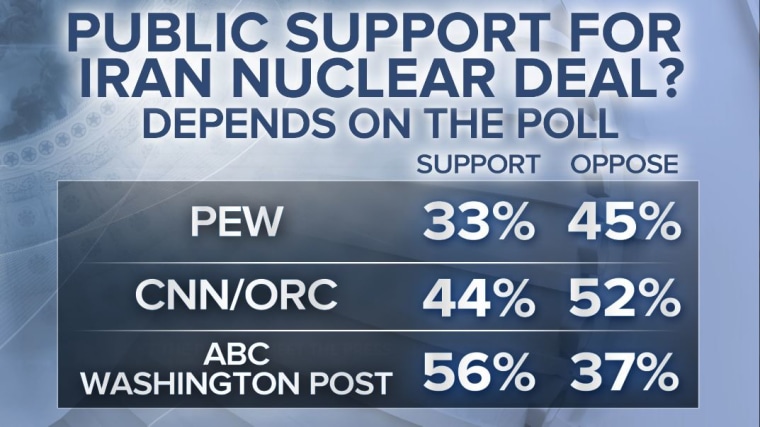And now a quick multiple choice quiz on the how Americans feel about the Iran nuclear deal.
Do Americans A) Strongly disapprove of the deal, B) Reject the deal, but by a fairly close margin, or C) Support the deal?
The answer is D, all of the above, it just depends on whose numbers you use. Polls over the last few weeks show remarkably different results on attitudes about the agreement and one of the big differences seems to be how the question is phrased.
A poll from the Pew Research Center found only 33% approved of the agreement when it asked, “From what you know [about a recent agreement on Iran's nuclear program between Iran, the United States and other nations], do you approve or disapprove of this agreement”
A CNN/ORC poll discovered 44% approved of it when it asked, "As you may know, the U.S. Congress must approve the agreement the United States and five other countries reached with Iran that is aimed at preventing Iran from developing nuclear weapons before it can take effect. Do you think Congress should approve or reject the deal with Iran?"

Meanwhile, an ABC News/Washington Post poll showed 56% supported the agreement when it put the question this way: "As you may know, the U.S. and other countries have announced a deal to lift economic sanctions against Iran in exchange for Iran agreeing not to produce nuclear weapons. International inspectors would monitor Iran's facilities, and if Iran is caught breaking the agreement economic sanctions would be imposed again. Do you support or oppose this agreement?"
Those are some sharply different numbers on the same issue asked in roughly the same period of time. And the most noticeable differences on them are the amount of detail in the questions. The Pew question offers the least amount of detail in describing the plan, less than 30 words, and shows the least support. The ABC News Washington Post poll gives the greatest amount of context, 56 words in the question, and shows the greatest support. The CNN poll is in the middle on words and support.
There isn’t really a right or wrong here. Arguments can be made for both approaches. Less context measures more of a gut reaction to the deal, while more allows the caller to weigh at least some points before answering.
It should be noted that the Iran deal is not alone when is comes to context of a polling question shaping results. Similar differences can be found on a variety of complicated issues depending on wording, such as immigration.
The overarching lesson it is that people’s attitudes on such topics, including the Iran deal are subject to change depending on context. Or, if you’re a political consultant, attitudes can change depending on how the issue is framed. That’s where the discussion the deal is now – in the hands of supporters and opponents who want to push the public one way or the other.
There is one other important note in all these numbers. In the polls on the Iran deal people were asked whether they support/approve of the agreement or oppose/disapprove of it. None of the polls directly offered the option of “don’t know.”